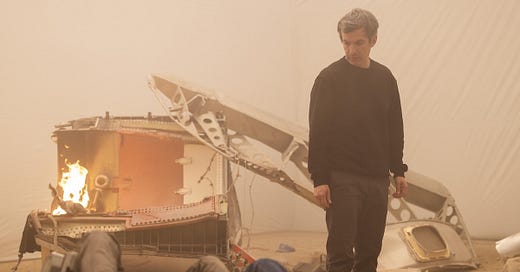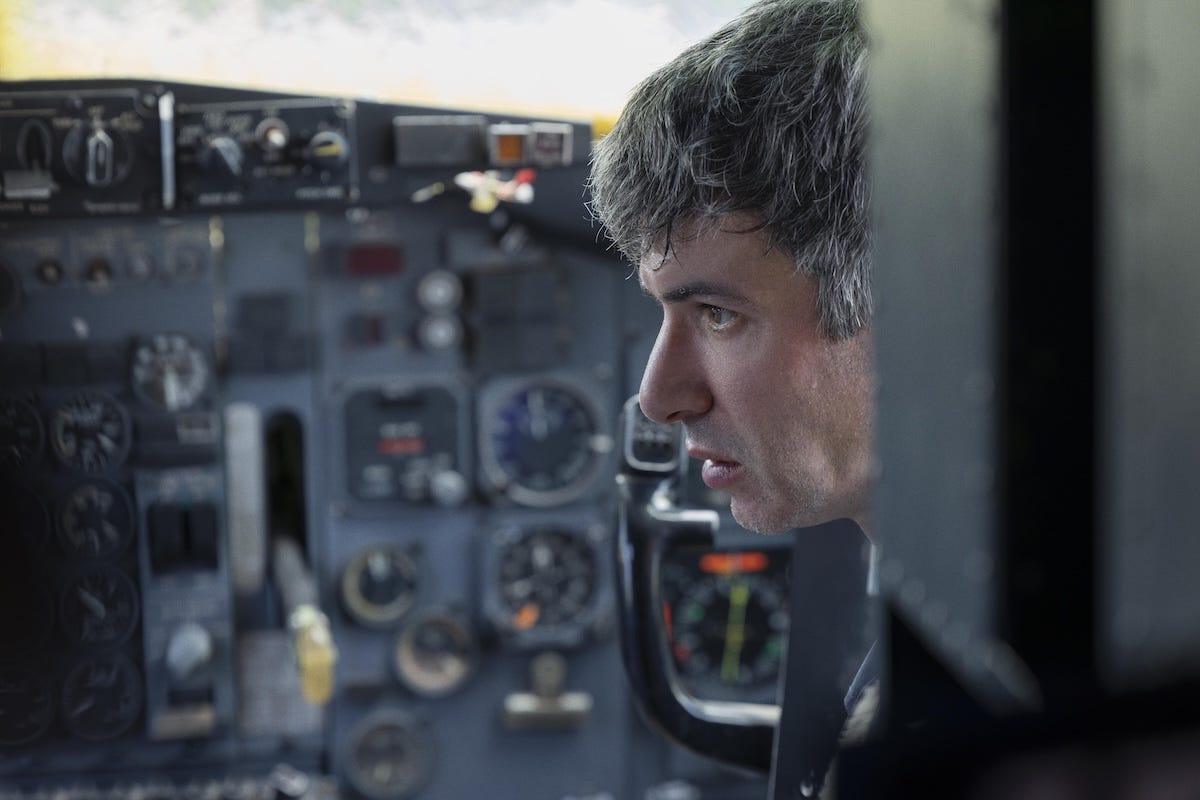
‘The Rehearsal’s’ Startling Honesty
How Nathan Fielder can help you defeat impostor syndrome.
Rarely has a work of televisual art so flummoxed me as Nathan Fielder’s show The Rehearsal, the second season of which just wrapped up. Both a parody of reality shows and comedy-news shows, and a heartfelt examination of the ever-widening bifurcation between our self-perception and the way we choose to identify to others in the world—a split that, ironically, merges fake and real into something like a unifying whole—The Rehearsal is simultaneously steeped in detached irony and deeply genuine. It is a bundle of contradictions about the unreality of our world, which may make it the realest show on TV.
Fielder had already made a name for himself as someone who played with the boundaries of fake and real. For his mid-2010s parody reality series on Comedy Central, Nathan for You, he posed as an MBA from Canada’s finest business school helping revitalize real struggling small businesses. His appearances on late-night shows to promote that show were often exercises in absurdism. With The Rehearsal, he proposed a method to help people overcome having to engage in awkward conversations: rehearsing them. The premiere episode, which debuted in 2022, undersold just how weird this show would be: He found a guy who had lied about having a master’s degree and wanted to confess his sins to his trivia teammate; to help him do this, Fielder hired actors to pretend to be the teammate and run through a variety of scenarios in the hopes of generating a comedy flow chart.
But Fielder did more than that. He built a replica of the trivia team’s bar, down to the wall décor, to ensure the scenario would feel real. He had the actors shadow the real people they’d be playing to gain verisimilitude. And yet, Fielder did more than that. Fielder built a replica of the trivia player’s apartment and hired an actor to mimic the trivia player so his (Fielder’s) own pitch would feel more polished. There was a level of recursion here that felt genuinely insane, something like a reality TV version of Charlie Kaufman’s Synecdoche, New York.
Or maybe “reality” TV. There have been questions since Nathan for You how “real” any of this is, how many of his subjects were actors and how many of his scenarios were contrived. Indeed, one of the first episodes of that earlier series involved Fielder elaborately faking a clip of a pig rescuing a goat from a lake in the hopes of making a petting zoo go viral, only to see the video actually go viral in the real world via a pipeline that took it from Gawker and eBaumsWorld to NBC Nightly News and Fox News. Fielder and his team didn’t do anything to help this spread, but they didn’t do anything to dissuade it either. “We found it interesting that people were sharing it without us saying anything,” Fielder deadpanned to the New York Times at the time.
How much of The Rehearsal is like the pig and goat is an open question, and somewhat controversial. As that initial season continued, the “rehearsal” concept expanded into an entire fake family. Fielder found a woman who said she wanted to have kids but was concerned about how to raise them; the production obtained a house and hired a revolving band of child actors who would age a year every couple of weeks. Fielder, naturally, played the husband. Eventually, she and Fielder “split up,” but Fielder tried to “raise” the kids by himself, which led to an intensely awkward moment in which one of the 6-year-old actors—who was, in real life, being raised by a single mother—called Fielder “Daddy” and refused to leave the set.
As a parent myself, this was a surprisingly distressing sequence of events, at least in part because it was so hard to process how to react to it. Do we take this at face value, with the kid having imprinted so tightly on Fielder because he doesn’t have a dad at home? Is the kid just a child actor, pretending to play out the scenario as Fielder has instructed? If it’s real, is this a condemnation not of reality TV but of the very existence of child actors below a certain age, since the kid was initially hired to pretend to be Fielder’s son? Perhaps most importantly, for our purposes: If it is fake, if it is all an act, will I look like a rube for being upset by this child’s faux-distress?
It’s that tension between perception and reception that The Rehearsal’s second season tackles. At the figurative 30,000-foot level, Fielder is shifting the focus of his parody from reality TV to the genre of comedy news. The Daily Show and John Oliver Tonight, that sort of thing: programs that attempt to effect change while also making people laugh, a combination that, paradoxically, makes the call to action less urgent by rendering it silly. Clown nose on, clown nose off.
Fielder takes a quiet knife to the whole genre, particularly in the second episode. Discovering that one of the episodes of his previous show, Nathan for You, had been censored on Paramount+ over German concerns of antisemitism, he creates an elaborate rehearsal in which he travels to Germany, dresses a hall as a war room, and costumes the German actor portraying the Paramount exec he’d like to question as a Nazi. Graphics show Paramount’s censorship spreading from Germany through the rest of the globe, calling to mind newsreel animations of the Third Reich’s spreading influence. The chattering classes marveled at the audacity—teehee, Fielder is calling Paramount Nazis, can you believe it?—but the real joke was on the whole comedy-news format. When Fielder asks the actor how he feels about the issue in question, the German man vents his frustration: Fielder is not interested in truth, he’s interested in winning an argument. He’s not interested in why Germans might have strict laws about antisemitic speech, given their, ah, history; he just wants to paint the opposition as fascist speech police. Anyone who has ever watched one of the “news” segments on The Daily Show should understand the point being made here.1
The specific topic Fielder tackles in this second season concerns the (literal) 30,000-foot view of things. After examining a series of black box recordings from fatal plane crashes, Fielder discerned that the most common problem occurred in the cockpit: a lack of communication between pilot and copilot leading to mistakes made while flying the aircraft. This seems like precisely the sort of problem his so-called Fielder Method could solve. If you could get pilots and copilots to rehearse their interactions beforehand, maybe some of that tension in the cockpit could be resolved, and pilots would be more willing to ask for help and advice in the event of an emergency.
What follows is an increasingly funny series of “rehearsals” to aid in that communicative effort, the apex of which is Fielder’s effort to recreate the life of Captain Chesley “Sully” Sullenberger. How did Sully land that plane? What in his life gave him the confidence to ask his copilot for his opinion in the final minutes of US Airways Flight 1549? Why did Nathan Fielder construct a nightmare set with a giant maquette mother as he was dressed in a diaper and nestled in a crib? How does the early-2000s rock band Evanescence play into all this?
This all culminates in a revelation in the finale that Fielder himself has learned to fly, that he’s a licensed pilot with hundreds of hours in the air, and that he has, through a loophole of sorts, obtained the ability to fly a 737 with a plane full of people. The final hour is, honestly, kind of harrowing, Fielder first showing that it took him much longer than usual for a student in flight school to learn how to land before piloting a plane full of extras on a two-hour tour of the Mojave. We know they don’t die—that probably would have made the news—but we’re still curious to see how he pulls it off.
Or if he pulled it off, I guess. Is he flying and landing the plane? Would HBO allow that? Or is it an elaborate magic trick of sorts, misdirection and sleight of hand alluded to by an earlier sequence in which Fielder confesses a childhood love of magic?2 The question, ultimately is this: Does it matter if he actually flew the plane because he gained the confidence necessary to do so or if he just makes us think he flew the plane because he gained the confidence necessary to do so? If we perceive him to have done it, isn’t that as good as him actually having done it? Here are the season’s closing lines of dialogue: “They only let the smartest and best people fly a plane of this size, and it feels good to know that. No one is allowed in the cockpit if there’s something wrong with them. So if you’re here, you must be fine.”
And while some may wrinkle their nose at the decision to simply state the season’s theme aloud, Fielder did something similar at the end of The Rehearsal’s first season, telling a child actor, “Life’s better with surprises. I mean, some things you want to be prepared for, but you know what I mean.” Both finales are blunt, but I can’t dismiss them as disingenuous; there’s an honesty here that’s missing from similarly self-aware productions about the recursive, modern era of screen-mediated living like Bo Burnham’s Inside.
Ultimately, The Rehearsal is less about convincing the Federal Aviation Administration to do anything about pilot/copilot relations, and more about convincing people to trust themselves and their instincts, to be assertive. Whether or not you feel the need to practice with a scene partner to achieve that assertiveness, well, I leave that up to you.
As it happens, I oppose such speech laws because I’m more or less a free-speech absolutist—I do not trust the government to decide what constitutes “hate speech”—but the actual text of the episode concerns the debate over speech less than the broader metadebate over how these things are framed and who does the framing. The whole “clown nose on, clown nose off” aspect of The Daily Show and its successors has been deeply damaging to the general discourse.
If there is sleight of hand in the finale, I think it’s putting the coda in which we see Fielder flying multiple 737s for a jet-relocation company—which demonstrates pretty conclusively, I think, that he has the hours and the capability to fly one of these things—at the end of the episode. I would guess he actually did all that before flying the plane full of people as proof of concept. But I could be wrong.



















I adore this show. Nathan does an incredible job of weaving fiction with reality to engage God honest questions. I'm glad to know that I will one day be able to tell my kids where I was when the Miracle Over the Mojave happened.
As interesting as all the recursive meta-humor of "The Rehearsal" is, by far the funniest part of the second season was the older woman from one of the early episodes describing her wet dream about Albert Einstein—just a moment of (seemingly) unscripted weirdness.